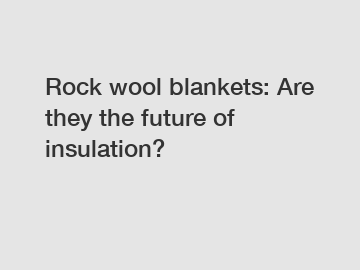Rock wool blankets: Are they the future of insulation?
When it comes to insulating your home or building, choosing the right material can make a significant impact on energy efficiency and comfort. While traditional insulation materials like fiberglass and foam board have been widely used for decades, there is a new player on the market that is gaining traction – rock wool blankets. So, are rock wool blankets the future of insulation? Let's dive in and explore the benefits of this innovative material.
Rock wool blankets, also known as mineral wool or stone wool, are made from natural rock materials such as basalt or diabase. The rocks are heated to high temperatures and then spun into fibers, which are then formed into dense, flexible blankets. The result is a highly effective thermal insulation material that offers superior fire resistance, sound absorption, and moisture resistance.
One of the key advantages of rock wool blankets is their fire resistance. Unlike traditional insulation materials like fiberglass, rock wool is non-combustible and can withstand temperatures of up to 1,000 degrees Celsius. This makes it an ideal choice for buildings that require a high level of fire safety, such as commercial kitchens, industrial facilities, or multi-family housing units.

In addition to their fire resistance, rock wool blankets also offer excellent sound absorption properties. The dense fibers of rock wool can help reduce noise transmission between rooms and floors, creating a quieter and more comfortable living or working environment. This makes it a perfect choice for buildings located in busy urban areas or near highways or airports.
Another benefit of rock wool blankets is their moisture resistance. The hydrophobic properties of rock wool prevent water from being absorbed into the material, making it an ideal choice for areas with high humidity or condensation issues. This can help prevent mold growth, improve indoor air quality, and prolong the lifespan of the insulation.
Furthermore, rock wool blankets are environmentally friendly and sustainable. Unlike foam insulation materials that are made from petrochemicals, rock wool is made from natural and abundant rock materials that can be recycled and reused. This reduces the environmental impact of insulation manufacturing and disposal, making it a more sustainable choice for eco-conscious consumers.
Overall, rock wool blankets offer a compelling combination of fire resistance, sound absorption, moisture resistance, and sustainability that make them a promising option for the future of insulation. With their superior performance and environmental benefits, rock wool blankets are quickly becoming the material of choice for architects, builders, and homeowners looking to improve the energy efficiency and comfort of their buildings.
As with any insulation material, proper installation is crucial to ensure maximum performance and energy savings. It is recommended to hire a professional insulation contractor who has experience working with rock wool blankets to ensure the material is installed correctly and effectively.
In conclusion, rock wool blankets are a versatile and high-performance insulation material that offer a range of benefits for both residential and commercial buildings. With their superior fire resistance, sound absorption, moisture resistance, and sustainability, rock wool blankets are paving the way for a more energy-efficient and comfortable future. Consider incorporating rock wool blankets into your next insulation project to reap the rewards of this innovative material.
If you want to learn more, please visit our website ceramic fibre blanket dealer, high alumina bricks, Fireclay Brick Recipe.
125
0
0

Comments
All Comments (0)